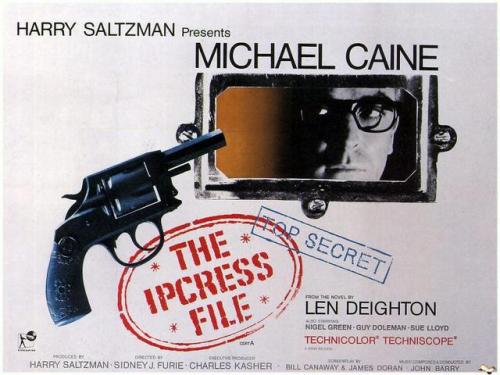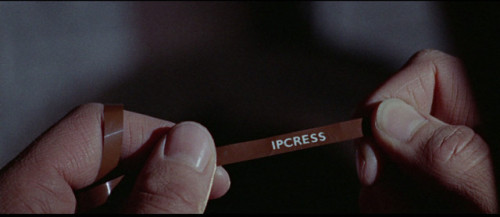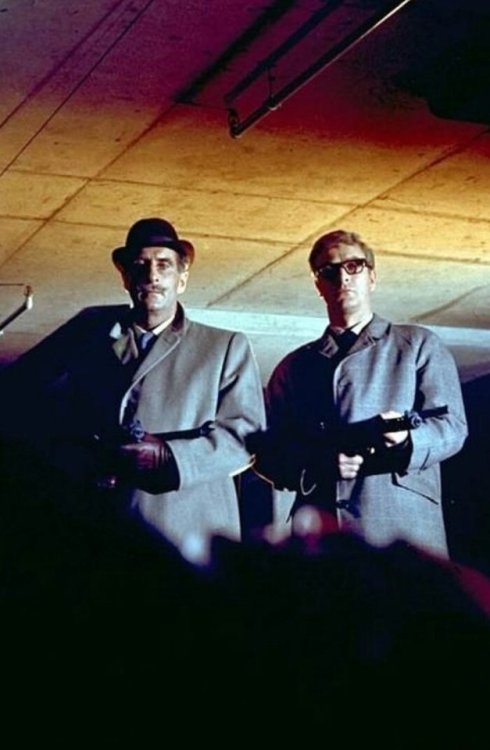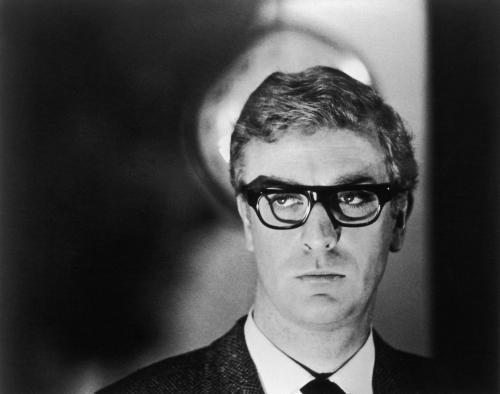O
investigador Harry Palmer foi criado para ser o oposto de James Bond. Ele
deveria ser um homem comum que não usa engenhocas em suas missões e que nem
sempre se ocupa de seduzir mulheres bonitas. Até seu nome deveria ser bobo:
Harry Palmer foi o nome mais bobo em que Michael Caine conseguiu pensar para o
personagem. Mas o primeiro filme de Harry Palmer, “Ipcress – Arquivo Confidencial”
(1965), não tem nada de bobo.
Investigator
Harry Palmer was created to be an anti-Bond. He is supposed to be a common man
who does not use gadgets in his missions and who is not always seducing
beautiful women. Even his name is supposed to be boring: Harry Palmer was the
most boring name Michael Caine could come with for the character. But Harry
Palmer’s first film, “The Ipcress File” (1965), is not boring at all.
O ótimo
porém insolente sargento Harry Palmer (Michael Caine) é transferido pelo
coronel Ross (Guy Doleman) para uma nova função, ficando no lugar de um homem
que foi morto recentemente. Este homem estava investigando a aposentadoria
repentina de grandes cientistas que estavam bem e de repente perderam suas
habilidades.
Great yet
insolent sergeant Harry Palmer (Michael Caine) is transferred by Colonel Ross
(Guy Doleman) to a new position, replacing a man who had just been killed. This
deceased man was investigating the sudden retirement of top-notch scientists
who were just fine and suddenly couldn't function anymore.
Harry pode
estar trabalhando para o major Dalby (Nigel Green), mas ele ainda prefere suas
velhas técnicas de investigação. Não importa o que Harry faça, Dalby acha que “não
é bom o suficiente”. Isso acontece até que Harry e a equipe encontram uma fita
de áudio onde está escrito “Ipcress”.
Harry might
be working for major Dalby (Nigel Green) now, but he still prefers his old
investigation techniques. No matter what Harry does, Dalby thinks “It's not
good enough”. This happens until Harry and the team find an audiotape with
“Ipcress” written on it.
Descobrir
a função da fita não será o único desafio de Harry: ele também se envolverá com
uma agente, descobrirá que tanto Rossa quanto Dalby querem a fita e será cobaia
em um experimento torturante. Para tornar tudo um pouco pior, Harry será
seguido por um homem com óculos de armação quebrada.
Finding out what
the tape does won't be Harry's only challenge: he will also get involved with a
female agent, he will find out that both Ross and Dalby want the tape and he
will go through a torturing experience. To make things a bit worse, Harry will
be followed everywhere by a man with broken glasses.
“Ipcress –
Arquivo Confidencial” é um filme com uma trama muito complexa – quase tão
complexa quanto a de “O Espião que Sabia Demais” (2011). Mesmo assim, há espaço
para humor quando Harry e seu chefe conversam, de maneira não muito amigável, enquanto
fazem compras de supermercado. Há também uma sequência de muito suspense em uma
garagem subterrânea onde um homem ferido é resgatado.
“The Ipcress
File” is a film with a very complex plot – almost as complex as “Tinker Taylor
Soldier Spy” (2011). Nevertheless, there is room for humor as Harry and his boss
talk, not exactly in an amicable way, while they do grocery shop. There is also
a very suspenseful sequence in an underground parking lot as a hurt man is
traded by cash.
Há uma boa
quantidade de ângulos criativos, que nos fazem ver a ação através de lentes de
óculos, cabines telefônicas transparentes, pequenas aberturas e buracos nas
paredes. De acordo com Michael Caine, o diretor Sidney Furie decidiu filmar as
cenas como se o público estivesse seguindo a ação detrás de alguma coisa, como
um agente escondido.
There is a
fine amount of creative shots, making us see the action through glass lenses,
transparent telephone boots, small apertures and holes in walls. According to
Michael Caine, director Sidney Furie deliberately chose to shoot the film as
the public was following the action hiding behind something, as an undercover
agent.
Havia
muitas pessoas trabalhando em “Ipcress – Arquivo Confidencial” que haviam
trabalhado em filmes do 007: o produtor
Harry Saltzman, o editor Peter Hunt, o designer de produção Ken Adam e o
compositor John Barry. Sendo profissionais versáteis, eles conseguiram criar
uma atmosfera muito diferente da dos filmes de James Bond – a diferença mais perceptível
é a música.
There were
many people working on “The Ipcress File” who had also worked in Bond movies:
producer Harry Saltzman, editor Peter Hunt, production designer Ken Adam and
composer John Barry. As versatile professionals, they managed to create an
atmosphere as far from the Bond movies as possible – the most perceptible
difference is the soundtrack.
“Ipcress –
Arquivo Confidencial” foi um livro escrito por Len Deighton e publicado em
1962. No livro, narrado em primeira pessoa, o agente principal não tem nome. Já
que é raro para uma película ser filmada com ponto de vista de primeira pessoa –
a primeira metade de “Prisioneiro do Passado” (1947) é uma exceção – os produtores
precisavam de um nome para nosso anti-herói. Michael Caine sugeriu o nome, e
usou o sobrenome de seu colega de escola mais chato. Caine também escolheu
manter os óculos que o personagem usava no livro para fazer Palmer mais humano –
e para ajudar na caracterização de Caine, já que o ator usa óculos na vida
real. Como alguém que usa óculos, fico feliz em ver um investigador cuja vista
é tão ruim quanto a minha.
“The Ipcress
File” was a book written by Len Deighton and published in 1962. In the book,
narrated in the first person, the lead agent had no name. Since it’s rare for a
movie to be filmed with a first person point-of-view – with the first half of “Dark Passage” (1947) being one exception – the producers needed a name for our
anti-hero. Michael Caine suggested the name, and took the surname from his most
boring school classmate. Caine also chose to keep the glasses the character
used in the novel as a way to make Palmer more down-to-Earth – and to help Caine’s
characterization, as the actor wears glasses in real life. As someone who wears
glasses, I’m happy to see an investigator whose sight is as bad as mine.
“Ipcress –
Arquivo Confidencial” deu origem a uma pequena série de filmes – foram seis no
total. Michael Caine não interpretou o protagonista em apenas um deles, “Spy Story”
(1976), no qual o protagonista recebeu outro nome. Os dois últimos filmes da
série não oficial de Harry Palmer foram feitos diretamente para a TV.
“The Ipcress
File” originated a small series of films – there were six in total. Michael
Caine didn’t play the lead in only one of the films, “Spy Story” (1976), in
which the lead was also renamed. The last two films of the unofficial Harry Palmer
series were made for TV in the 1990s.
“The Ipcress
File” was a huge success. As it was Michael Caine’s first time as he lead, he
soon became a superstar – and he wasn’t even the producer’s first choice:
Saltzman wanted Christopher Plummer for the role, but Plummer chose to do “The
Sound of Music” instead. In 1999, “The Ipcress File” was voted the 59th
best British film ever by the British Film Institute. And, even though Harry
Palmer was created to be an anti-Bond, we all can agree that Michael Caine is
as cool as any actor who played agent 007, isn’t he?
This is my
contribution to the Second Marvellous Michael Caine blogathon, hosted by Gill at Realweegiemidget
Reviews.









2 comments:
Thanks for your lovely post Le, that does sound interesting just imagining Plummer in this role and Caine in his - that would have been amazing. Thanks for joning my blogathon.
I have always wanted to see The Ipcress File, but for some reason I haven't crossed paths yet. Loved your review! It sounds like Michael Caine's influence on his character and in this film made it even better than it would otherwise have been.
Post a Comment